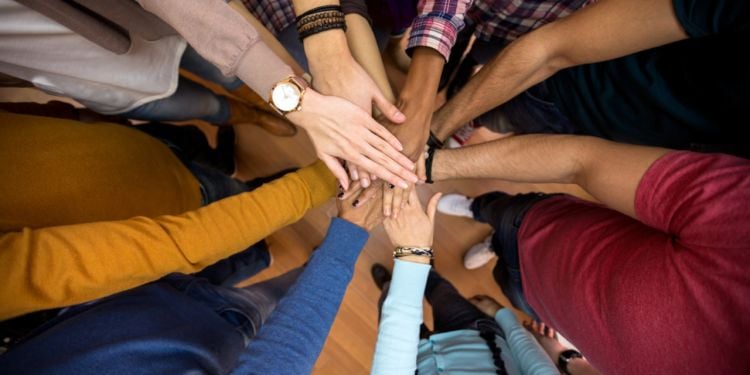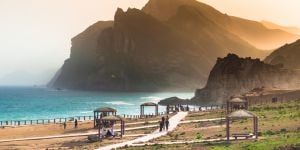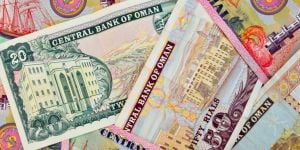
Oman is known for its rich cultural diversity, which is largely influenced by the significant expatriate community living and working there. The expatriate population in Oman comes from various parts of the world, contributing to the nation's social fabric and economy. The total population in Oman is almost 5 million, with more than 40% of expatriates.
Expat communities in Oman
Diverse expat communities have a significant impact on Oman's cultural landscape. This diversity is evident in the variety of restaurants, cultural festivals, and social events. Expats bring their traditions, cuisines, and cultural practices, enriching the social diversity of the country.
Indians: The largest expatriate community in Oman represents nearly 40% of the expatriate population.
Bangladeshis: about 30% of expatriates.
Pakistanis: approximately 10-15% of the expatriate population.
The well-settled and integrated Indian community
As one of the largest expat communities in Oman, Indians play a key role in various sectors such as retail, construction, healthcare, and IT. The Indian community has well-established schools, cultural centers, and businesses. The community's long history in Oman has significantly contributed to the country's economic, cultural, and social life, with most of them living in major cities such as Muscat, Sohar, and Salalah. The diverse community comprises people from different states and linguistic backgrounds in India. Major groups include Malayalis, Gujaratis, Tamils, and Punjabis, reflecting their linguistic and cultural diversity. They occupy a wide range of positions, from blue-collar to management roles.
Many Indians in Oman are successful entrepreneurs running businesses in the retail, hospitality, trading, and services sectors. Indian companies are integral to the Omani economy, contributing to job creation and economic growth.
There are many Indian cultural associations and community organizations in Oman, such as the Indian Social Club and its regional branches. These organizations organize cultural events, festivals, and social activities, helping to maintain cultural ties and support community members. The Indian community is famous for various Indian festivals, such as Diwali, Eid, Holi, Onam, and Navratri, with great enthusiasm. These events are often celebrated with social gatherings, cultural performances, and traditional cuisine.
Indian community organizations often engage in philanthropic activities, including supporting underprivileged community members, organizing blood drives, and contributing to local causes.
The Indian Embassy in Muscat plays a vital role in supporting the Indian community, offering consular services, legal assistance, and community outreach. The Embassy also organizes events and activities to promote cultural exchanges and strengthen bilateral relations.
While the Indian community in Oman has a strong cultural identity and community support, integrating into broader Omani society can pose challenges, particularly concerning linguistic and cultural differences.
Bangladeshi residents in Oman
The Bangladeshi community in Oman is a significant expatriate group that contributes to the country's workforce and cultural diversity. Most of them work in construction, services, and small businesses. This community has grown considerably over the years, with members involved in various sectors of the Omani economy. Members of the Bangladeshi community are scattered throughout Oman, and they celebrate national and cultural festivals such as Pohela Boishakh (Bengali New Year), Eid-ul-Fitr, Eid-ul-Adha, etc. These celebrations often include traditional music, dancing, and food. Bangladesh has several public organizations and cultural groups.
However, the community faces different problems, in particular related to employment conditions, legal status, and access to specific services. Cultural differences and language barriers can also cause integration issues. The Omani government and the Bangladeshi embassy continue to make efforts to address these issues and improve the welfare of workers. The community retains a strong cultural identity and support networks but faces labor rights and integration challenges.
The Pakistani community in Oman
Pakistanis are also a major community in Oman, involved in various industries from construction to commerce and healthcare. This community has established a considerable presence in various sectors and exerts a rich cultural influence on the country. Pakistanis have migrated to Oman for decades, especially in the late 20th century. This movement was due to labor in the development of Oman, especially during the oil boom. The historical connection between Pakistan and Oman, including geographical proximity and cultural connections, has contributed to the immigration and village life of Oman's Pakistanis. Pakistani doctors and medical professionals also contribute significantly to Oman's healthcare sector.
Muscat's Pakistan Embassy offers important services to communities, especially consular services, legal support, and cultural and public events.
Good to know:
Children of Pakistani expatriates in Oman often attend international schools, local private schools, or special government schools that follow the Pakistani curriculum. These schools help maintain cultural and educational ties with Pakistan.
The Filipino expatriate community
The Filipino community in Oman is one of the largest expatriate groups in the country. It is known for its vibrant culture and contributions to various sectors of the Omani economy. The Filipino community is engaged in a wide range of professions, including health care, education, hospitality, retail, construction, and domestic services. Many Filipinos work as nurses, teachers, hotel staff, sellers, engineers, and skilled workers. Many of them also work as domestic workers, including nannies and cooks. In addition to blue-collar jobs, many Filipinos work in managerial positions, especially in the health, hospitality, and corporate sectors. The Philippine community celebrates large-scale Philippine holidays such as Independence Day and Christmas and maintains a strong cultural identity. These events often include traditional music, dance, food, and artistic ideas.
Other Asian and Arab communities
Like Filipinos, Sri Lankans also work in various service industries, such as domestic work, hospitality, and healthcare. In Oman, there are also many expats from the Middle East and North Africa. Egyptians in Oman work in various professional fields, such as education, engineering, and medicine. Jordanian and Palestinian communities are often found in professional fields such as education, finance, and health.
Western expats in Oman
Expatriates from the UK, France, Germany, and other European countries are typically employed in managerial, technical, and educational roles. They are often found in sectors like oil and gas, engineering, and international schools. Western expatriates in Oman are a diverse and influential group, contributing significantly to various sectors of the economy and enriching the country's population diversity. Although exact numbers may vary, they make up a small proportion of the total number of expatriates in Oman compared to South Asians and other nationalities.
Good to know:
Western expatriates often live in high-class areas and gated communities. Districts such as Al-Mouj, Qurum, and Shatti Al-Qurum in Muscat are popular thanks to their amenities and their proximity to international schools and social clubs.
Although Western expatriates maintain a clear cultural identity, many are involved in the Omani culture through social interactions, cultural events, and festivals. They often participate in community activities sponsored by international clubs and embassies. Many social clubs and associations provide services to Western expeditions, providing communication, network communication, and cultural exchange platforms. Examples include British clubs, American women's groups, and various national chambers of commerce.
Western expatriates in Oman often enjoy different recreational activities, including golfing, sailing, hiking, and exploring Oman's natural landscape. They usually send their children to international schools that offer the curriculum of their home country, such as the American, British, or International Baccalaureate system.
Good to know:
Oman is considered family-friendly, with Western expatriates often citing the quality of life, safety, and welcoming environment as key factors for relocating with their families.
But while enjoying the comfortable lifestyle and unique cultural experiences of living in the Middle East, Western expats also face challenges adapting to a different cultural and regulatory environment.
Religious diversity in Oman
Although Islam is the official religion of Oman, there are also several non-Muslim communities, mostly made up of expatriates. The Omani government is known for its respect for religious freedom, allowing different communities to practice freely in their places of worship.
Important:
Like many countries in the region, Oman has strict laws regarding blasphemy and defamation of religion. Publicly criticizing or offending Islam or the Prophet Muhammad is punishable by law.
Oman's Christians include mainly expatriates and small local communities. There are several churches in Oman, particularly in Muscat, including the Catholic Church of Saints Peter and Paul and the Protestant Church of Oman.
Hinduism is practiced mainly by the large expatriate Indian community. Hindus are allowed to worship in temples in Oman — one of the most famous is the Shiva Temple in Muscat, built in the early 19th century.
Buddhism and Sikhism are also practiced by expatriate communities, mainly from Southeast Asia. They do not have large communities, but their followers are allowed to practice their faith privately.
Gender equality in Oman
Oman has made great strides in gender equality in recent years, strengthening women's rights, participation in the workforce, and women's representation in public life. But, as in much of the world, challenges remain. Women in Oman can own properties and have access to education. Moreover, women, especially in education, healthcare, and public sector, are increasingly working.
According to the latest data, women make up about 30% of Oman's workforce, a significant improvement over past decades. Women also have the right to vote and run for office.
Although women's representation in Omani politics has increased, it remains relatively low compared to men. Women are members of the Shura Council (Oman's consultative assembly) and hold senior positions in government ministries and agencies. However, cultural norms, legal restrictions in family law, and disparities in representation continue to pose challenges to full gender equality.
Enhanced integration of people with disabilities in Oman
Oman has made notable efforts to support people with disabilities through various laws, policies and initiatives aimed at ensuring their inclusion and participation in society. However, challenges remain in terms of accessibility, public attitudes, and employment opportunities.
While some public buildings, government institutions, and transport systems in Oman are accessible to people with disabilities, widespread implementation of accessibility standards is still required. Many public places do not always have ramps, elevators, or accessible toilets.
Still, people with disabilities in Oman can take part in sporting events, such as those organized by the Oman Paralympic Committee, which promotes adaptive sports for people with physical and intellectual disabilities.
The Disabled Care and Rehabilitation Law (1996) defines the rights of persons with disabilities in Oman and focuses on rehabilitation, health, education, and social services. The law makes the government responsible for providing necessary services and assistance to people with disabilities. Oman's labor law requires companies to allocate at least 2% of their workforce to people with disabilities, a policy that is part of a broader effort to integrate people with disabilities into the labor market.
Safety in Oman
Oman is considered one of the safest countries in the Middle East, with a low crime rate and strong security. The country's stability and security are attributed to a combination of strict adherence to the law, conservative social values, and the country's effective legal system. Theft and burglary are the most common types of crimes recorded in Oman, but the indicators remain low. Houses and car burglaries sometimes occur, but much lower than in many other countries. Domestic violence is often underreported due to cultural and societal factors, but it still exists. The Omani government is committed to supporting victims and raising awareness about the issue.
Oman is considered safe for women, and there are few incidents of harassment and violence against women. Both local and foreign women report that women generally feel safe in public places.
Good to know:
Expatriates who commit crimes in Oman face deportation after serving their sentence. Crimes such as theft, drugs and visa violations can lead to heavy penalties and even deportation.
Useful links:
INDIAN SOCIAL CLUB SOHAR, Sultanate of Oman
We do our best to provide accurate and up to date information. However, if you have noticed any inaccuracies in this article, please let us know in the comments section below.








